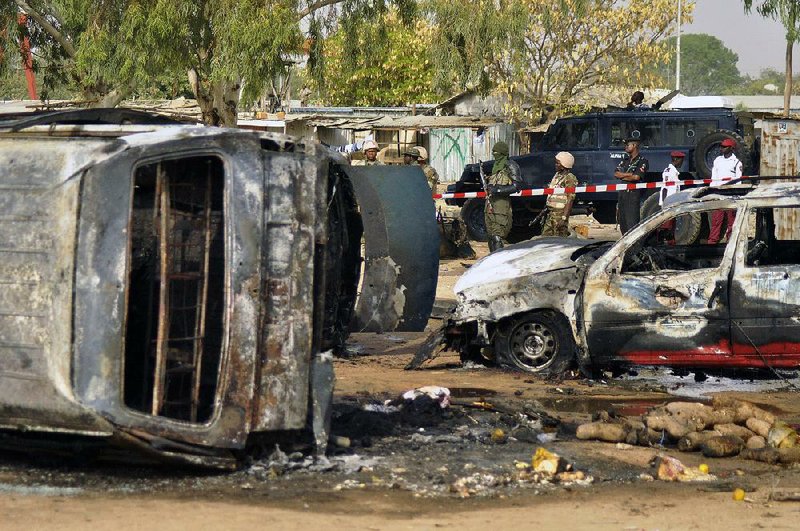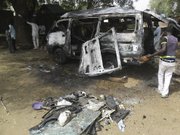POTISKUM, Nigeria -- Teenage suicide bombers, suspected as being Boko Haram extremists, killed at least 24 people in separate blasts Tuesday at crowded bus stations in two northern Nigerian cities 185 miles apart.
In an apparently unrelated development, an American missionary was kidnapped from a school in central Kogi state. The Rev. Phyllis Sortor was taken away Monday by several abductors, according to a statement on the website of the Free Methodist Church in Seattle. Kidnappings for ransom are common in Nigeria, and many victims are returned unharmed.
In the northeastern town of Potiskum, a young man forced his way onto a bus and detonated explosives that killed 12 people and injured 20, according to the bus driver and hospital records.
Hours later, two young men were blamed for explosions that ripped through a bus station in northern Kano city, killing at least 12 people and injuring many more, according to state police commissioner Ibrahim Idris. Witnesses said the bombers appeared to be 17 or 18 years old.
The explosions in Kano, Nigeria's second-largest city, triggered fires that destroyed two buses and a car, Idris said.
The attack in Potiskum came two days after a young girl carried explosives that detonated, killing her and four others at a market in the same town.
Bus driver Adamu Isa said a security guard stopped a man who set off a metal detector as passengers were boarding his bus in Potiskum.
"He was told to stand to one side but instead forced himself onto the bus and blew himself up," said Isa, who considered himself lucky to be alive.
There was no immediate claim of responsibility for Tuesday's blasts, but they bear the signs of similar attacks by Nigeria's home-grown Boko Haram Islamic extremist group.
On Monday, a woman walked into a primary school in Fune, another area of Yobe state, and tried to give pupils a parcel to deliver to the headmistress. When they refused, she ran off, leading security agents to surmise she may also have been carrying a bomb, teacher Mohammad Isa of Damagum Central Primary School said.
All schools in the area have been closed because of the possible threat.
Boko Haram means "Western education is forbidden" in the local Hausa language. The extremists have perpetrated numerous attacks on schools and students.
Nigeria's President Goodluck Jonathan commiserated with families of the victims and condemned the extremists for choosing such targets.
A presidential statement said recent victories by Nigerian troops who have retaken a dozen towns from Boko Haram show "the tide has now turned."
Jonathan said his administration will guarantee continuing success including to "drastically reduce" Boko Haram's ability to take and hold territory "or recruit, groom and brainwash young persons to undertake suicide bombing attacks on soft targets."
Attacks by girls and young women have raised fears that Boko Haram is using some of its hundreds of kidnap victims to carry out bombings. It is unclear whether the children are detonating explosives or if the blasts are remotely controlled.
At least 10,000 people have been killed in Nigeria's Islamic uprising in the past year, according to the Council on Foreign Affairs.
About 1.6 million people have been driven from their homes in Boko Haram's campaign to enforce strict Islamic law across Nigeria. The country's 160 million people are divided almost equally between Muslims and Christians.
Meanwhile, Nigerian officials said the kidnapping of the American missionary probably was not the work of Boko Haram.
The police commissioner of Kogi state, Adeyemi Ogunjemilusi, said a ransom of about $300,000 had been demanded by Tuesday afternoon, barely 24 hours after the kidnapping, which is not typical for Boko Haram.
In addition, the area where the kidnapping occurred -- south of Abuja, Nigeria's capital -- is not generally considered to be within Boko Haram's sphere of influence. Ogunjemilusi said the Islamists were not active in Kogi state.
In a statement on its website, the Free Methodist Church said Sortor had been kidnapped from the compound of Hope Academy outside Emiworo in Kogi.
Kidnappings do occur in Kogi with some regularity. This month, a top local official in Kogi state was abducted from his home by gunmen who used the same method -- scaling a wall -- that was used in the kidnapping of Sortor.
Ogunjemilusi said he was unable to identify who had made the ransom demand. All of southern Nigeria is prone to such kidnappings, with public officials, their relatives and foreign workers -- often in the oil industry -- regularly abducted for ransom.
Sortor's church declined to comment, and an official with the U.S. Embassy in Abuja did not respond to a request for comment.
Information for this article was contributed by Adamu Adamu and Ibrahim Garba of The Associated Press; and by Adam Nossiter of The New York Times.
A Section on 02/25/2015



